Lullaby (Ellie Jordan, Ghost Trapper Book 7) Read online
Page 2
If there was a reply, I didn't hear it.
I brought out my thermal goggles to scan the area more closely for cold spots or other strange activity—extreme hot spots were also likely around Anton—but nothing was there.
The lot where my old house once stood had apparently been de-haunted. I had always assumed I would be the one to do that. Calvin had always told me to hold back, to wait until I was truly ready to face that particular personal demon, because Anton Clay would have more of a psychological hold on me than any of the ghosts I usually faced in the course of my work. I thought that, at some point, I would capture his ghost and bury it up in our evil-spirit disposal site in the mountains, where he could never harm anyone again.
I wondered how he'd gotten free. Was it just the construction, or had something else happened? After all, multiple houses had been built on this site before, and all of them burned down eventually. Why would this particular construction project release Anton from the site altogether, when none of the others had done that? Had they somehow dug deeper, broken something loose?
I pointed my flashlight into the deep, muddy trench at the center of the site. If I was expecting to find some obvious piece of evidence that might explain it—Anton's skull, for instance, dredged up and cracked open by an excavator bucket—I was disappointed. There was nothing but mud and muddy water.
“Okay, Anton,” I said. “If you won't come to me, I'll come to you.”
I scooped up a sample of the mud in a glass jar and screwed the lid on tight. This was not Anton's official grave, but it was his burial earth, in a sense, from the place where he'd died and his spirit had been trapped for more than a century and a half. It might have some power over him, or at least some power to protect me from him.
I walked back along the broken driveway and scraped my muddy boots on the street asphalt. The streetlamp closest to the empty lot was burned out, and another one nearby flickered and buzzed as if ready to blow.
Anton had definitely left his mark on the neighborhood. If he was gone, maybe things could start to recover a little. It depressed me to see it all run-down like this. I remembered the area as more cheerful when I was a kid—more flower gardens, fewer weeds and thorns, kids running across lawns playing tag or hopping through the water sprinkler. Now it was desolate. Though Halloween had just passed an hour or so earlier, very few of the houses had a jack o' lantern or any other sign of the holiday, as if the residents were just too weary to bother acknowledging holidays anymore. It might be nice to drive by sometime and see the place looking less miserable.
Anton was now moving freely, though, and I had to find him quickly. If I took too long, I would be following the trail of fires and dead bodies in his wake.
Chapter Three
I parked behind our office, an old cinderblock building with a cracked parking lot, next to a car-crushing junkyard with a high fence made of sheet metal and chain link. I entered through the back, trying to keep quiet as I unlocked the door and stepped inside the garage bay where the blue van was parked. The back area of our building was a big open space full of tools, gear, computers, old filing cabinets, and plenty of cobwebs up around the corners.
I rifled through the older filing cabinets, opening one dusty drawer after another. In an old two-drawer cabinet tucked almost out of sight, I thought I'd found what I was looking for. Old brown accordion folders offered clutches of photographs showing hallways, stairs, and attics from dilapidated old mansions and buildings, as well as discs and even old cassette and VHS tapes filled with audio and video from locations Calvin had investigated over the years. He'd been finding ghosts around town and attempting to deal with them long before he opened his detective agency, maybe as long as I'd been alive. I could see why he might be tired of it by now, ready to turn the work over to someone else.
The way Calvin had explained it, if he didn't sell the agency to Paranormal Solutions, Inc., they would probably set up a competing shop and try to push us out of business, backed by their surprisingly deep pockets. Apparently those pockets were lined with revenue from their “Higher Self Centers” that offered everything from incredibly overpriced fruit smoothies and crystal jewelry to even more incredibly overpriced self-help and meditation seminars.
Their somewhat scammy way of raising money did not bother me nearly as much as the kind of research and development I'd glimpsed at a secret laboratory they owned in the North Carolina mountains. Captured ghosts, many of them with a history of being violent and dangerous, had been brought together for experimentation.
At our agency, we hurried to bury such entities deep in the ground where they couldn't harm the living. At PSI, they apparently kept some of them around to test new ghost-hunting equipment, but there were also attempts to control and train certain ghosts, as if they were wild animals that could be tamed and pressed into service.
I could actually think of some valid applications for what that company was doing. Good gear for fighting or capturing ghosts is rare, which is why my work is so hard. I usually find myself trying to lure a ghost into a little trap with some kind of bait that may or may not work. As far as effective weapons, we can use powerful lights and sacred music and symbols to try to ward off ghosts, but that's about it. As for the other kind of research I'd seen—well, there are situations where it helps to use one powerful ghost against another.
On the other hand...these were human souls, or at least lost fragments of them. Our goal should always be to try and release them if possible, to help them cross over to other side where they belong. We only make exceptions for the really dangerous ones, keeping them sealed in traps buried in the ground, and only when we must. I definitely did not feel good about the morality of binding the spirits of the dead and using them as servants.
A clanging, metallic racket sounded overhead, shattering the silence of the room. The elevator cage descended from upstairs, where Calvin kept his personal apartment. Not for much longer, I supposed.
The cage reached the bottom. The door swung open, and Calvin's bloodhound, Hunter, trotted toward me, wagging his tail in his lazy way.
“You're still here?” I asked Calvin as he rolled out in his wheelchair. He hadn't been sleeping well, judging by the dark patches under his eyes. He looked slouched and thin, older than his years. He wasn't even sixty. “I figured you'd be on the beach by now, sipping umbrella drinks and watching grannies in the bingo room.”
“Soon,” he said.
“I'm sorry to wake you. I know tomorrow's a big day, huh?”
“You didn't wake me. What are you looking for?” he asked, glancing at the old file cabinet in which I'd been snooping.
“I think you can probably deduce that,” I said. “You're the only real detective here.”
“That's not true. But I assume that, instead of sleeping peacefully at home as you should be, you're trying to track down Anton Clay. So you're pawing around in those files to locate information about his old properties.”
“Yep, that's exactly what I'm pawing around for, but my paws aren't finding any of it. I seem to be in the right date range, though. I'm looking at stuff from ten years ago here. Where's mine?”
“Stored safely away.” He gave me a tired smile.
“Anton is running around out there somewhere, Calvin. People could die.”
“I doubt he'll act tonight,” Calvin said. “His plans have been thwarted and he was knocked out of the useful vessel he possessed. He'll be licking his wounds, hunkering down somewhere.”
“That's how I'd like to find him. I'd rather not give him time to recover his strength.”
“And what about time to recover your own?” Calvin asked. “You've been running full-steam since facing Anton last night. Maybe there's wisdom in Michael's approach of laying low and getting some rest.”
“He's in a coma, Calvin.”
“You'll be in worse shape than that if you go after Anton now. All Anton wants is you. Don't serve yourself to him on a silver platter.”
&nb
sp; “If I don't, he'll come after everyone around me.”
Calvin regarded me quietly for a moment. “You're not planning on...surrendering to him, are you, Ellie? In some misguided attempt to protect others? Or perhaps some feeling that it is your fate to die at his hands?”
Well, Calvin knew me better than most people.
“It's not a suicide mission,” I said. “I plan to confront him.”
“Yes? And then what? Kickbox him over to the other side?”
“I...have some of the earth from the site of my old house. I figured I'd grab a trap...and...”
“Then what? What's your bait?”
“I'm the bait,” I said. “Maybe I won't know what to do when I find him, but I know that anybody near wherever he's hiding is definitely in danger. And if he kills again, he'll just grow stronger.”
“All right,” Calvin finally said.
“All right what?”
“You've convinced me.” He rolled to his office door and unlocked it with a key. “After all, you will be in charge around here soon.”
“Who, me?” I followed him into the cluttered office as he clicked on the light. Shelves overflowed with books and photocopies of ancient manuscripts held together with enormous binder clamps. “You mean right after Nicholas Nickleby and Kara the Russian viper girl, and anyone else they might decide to bring with them? I'll rank somewhere between janitor and dog walker around here. And Stacey will be scrubbing floors with a toothbrush. Or, on the bright side, they might just fire both of us.”
“They'll be keeping you and Stacey on staff,” Calvin said. “I have assurances from Olivia Lancashire herself.”
“I'm sure you have some great big assurances,” I said. “They probably will keep us on staff. Somebody has to fetch the coffee. I bet Kara's got a very specific order that has to be followed to the letter—I'm guessing half-caf, skinny soy, tears of children, blood of kittens, eye of newt, no sugar.”
“It's a good thing you bought me the fancy coffee machine,” Calvin said. “Honestly, Ellie. You'll be all right. They want your familiarity with the city and the region. The entire Lowcountry is ghost country. You'll be an asset. You both will.”
“I know, I already feel like I've been bought and sold. Anyway...where are the Anton Clay files?”
“Here.” Calvin unlocked the bottom drawer of his desk and slid it open. He withdrew an unmarked manila envelope, which he lay gently on his desk.
“Why did you lock those away?” I asked.
“I only put them here last night, after I spoke to you on the phone.”
“To hide them from me? Why?”
“So you wouldn't come sneaking in at night and take them while I slept, and then go running off in search of him by yourself, putting yourself in unnecessary danger,” he said. “Which is exactly what would have happened if I'd left them sitting out.”
“And now that you've cleverly predicted and prevented the future, what will you do next?” I asked. I took the envelope from the table and opened it.
“I suppose I will try to convince you to avoid those two locations until you're rested, the sun is up, and Stacey is by your side. Ideally, Jacob would be with you, too.”
“When was the last time you looked at them?” I asked. “These locations?”
“I suppose I could have driven past either of them any number of times without thinking about it. They were never significant,” he said. “I checked them over in the course of investigating your case when I first met you, but there was no sign of Anton there. Clay was always focused on the location of your parents' home, the location of his murders and his death.”
“So there could have been construction or redevelopment on either location since then,” I said. “We need to at least check and see whether anyone's in danger, and try to warn them away somehow if they are.”
“Tomorrow,” Calvin said.
“Tonight. Right now. I can just drive past these addresses, no big deal.”
“You're too exhausted to drive.”
“I'm fine, Calvin. I couldn't sleep if I tried.”
“We'll take my truck,” he said. “We may as well bring Hunter with us, too. The poor dog hasn't been any farther than the parking lot in weeks.”
The bloodhound looked up at the sound of his name and wagged his tail so hard his jowls jiggled.
We loaded up into Calvin's truck, with Calvin's wheelchair and some basic ghost-detection gear in the back under the camper shell. Calvin drove, while Hunter stood in my lap and watched the buildings pass outside the window as we headed downtown.
Chapter Four
East Broughton Street, close to Reynolds Square, has long been home to a little theater district. In the olden days, it was lined with playhouses and neon-lit movie palaces. Even today you can watch classic films screened at Trustees Theater or catch an actual opera at the Lucas.
The area is full of little cafes, bistros, and boutiques, but a large, forlorn building sits at one corner, its grand marquee sign surrounded by rows of empty light sockets, remnants of once-glamorous Art Deco design. The marquee is dark and has advertised nothing in years.
Calvin stopped in front of that long-wilted old movie palace, the last such building on the street that had not been rehabilitated into free-range clothing shops and farm-to-table shoe stores. It was brick, about three stories tall. A FOR LEASE sign was propped inside the sealed box office, barely visible under years of grime. A cage of metal mesh was rolled down inside the box office's cracked glass panels.
“I used to come here on Saturdays as a boy, when I could,” Calvin said. “I'd save up my pennies to watch Clint Eastwood and Glenn Ford regulate the Old West.”
“And that's how you decided to become a lawman,” I joked.
“Could be.”
Hunter sat up, his ears pricking as if he'd heard something. The city was fairly quiet. Though Halloween had just passed, it was now a few hours before dawn on a Monday morning. Most people had probably done their masked celebrating on Friday and Saturday night.
“What's up, Hunter?” I asked, rubbing his head. He poked his nose out the open window and sniffed.
“We've verified that the place is still uninhabited,” Calvin said. “Let's go to the next.”
“Someone reopened it as a nightclub a few years ago,” I said. “I found that online. It looks like it didn't last too long.” I opened the door, and Hunter stood up, wagging his tail.
“There's no reason to get out,” Calvin said.
“I'll just be a second. It's not like we're going to try to break in there or anything.”
“Ellie.”
“I'll be fine. I'm mainly doing it for Hunter. He needs the exercise.” I climbed out of the truck. The dog wiggled and shook on his leash beside me, then started toward the chained-up front door of the old theater.
“Stay where I can see you,” Calvin said. “I'd get out, but we're not going to be here long enough for all that.”
I nodded, letting the dog sniff as we crossed the sidewalk to the theater. I looked up at the sculptured facade, full of ornate little half-columns detailed with grape leaves, as if in honor of the Greek god of drama. The big marquee might have been a later Art Deco addition, but the building itself had been constructed in neoclassical style, like a little temple. It was first built as a playhouse in 1892, known as the Corinthian Theater, and then changed hands and purposes several times over the years. Sometimes it was a setting for live theater, sometimes a fancy place to watch movies. It had sputtered out of business a couple of decades ago.
Aside from the location's brief stint as a nightclub that I'd just learned about, all of that information had been in Calvin's original file about my parents' death. Decades before the theater opened, Anton Clay had owned a house on that spot. It had been his house in town. He'd also owned another house out at his plantation, which had been miles outside of town back in those days.
Hunter sniffed at the door.
“Is it a ghost?” I asked.
/>
Hunter barked and pawed at the door.
“I think he's picking up on something,” I said, raising my voice to make sure Calvin could hear me in the truck cab.
“Good,” Calvin said. “If Clay's here, he can't hurt anybody.”
“If he sets a fire, it could spread to some of these other businesses. Some of them look like they have apartments above them.”
“These buildings are brick,” Calvin said. “He sets fires when he knows he can kill someone. As long as nobody goes inside that theater—and it doesn't look like anybody's planning to do that within the next decade—he's not going to waste a big blaze just to light up an empty building.”
“I'm not sure he's that predictable.”
“Destroying empty property isn't his game. He's into murder, not petty vandalism.”
Hunter growled at the door. I could have found a way inside, picked a lock somewhere, but I knew Calvin would forbid it. I settled for taking lots of pictures. I was also taking audio recordings of the area around the box office and the doors inside. My Mel-Meter didn't pick up any unusual electrical readings, though.
“What are the chances Hunter is sniffing out something that isn't Anton?” I asked. “This theater's more than a hundred years old. It could have plenty of its own ghosts.”
“I'd say the chances are very good,” Calvin said. “I picked up a few strange things when I looked into it, but they didn't seem relevant to the case. You can't go chasing every ghost in town. Not in this town, anyway. Especially in an abandoned theater, where they aren't hurting anybody. Unless someone's foolish enough to go in there looking for trouble. Let's get going, Ellie.”

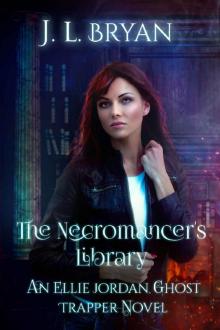 Ghost Trapper 12 The Necromancer's Library
Ghost Trapper 12 The Necromancer's Library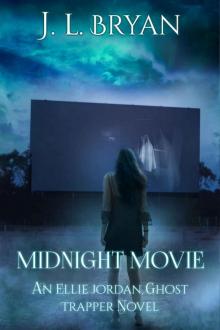 Ghost Trapper 14 Midnight Movie
Ghost Trapper 14 Midnight Movie_preview.jpg) Fairy Metal Thunder (Songs of Magic, Book 1)
Fairy Metal Thunder (Songs of Magic, Book 1)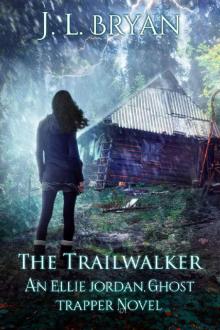 Ghost Trapper 13 The Trailwalker
Ghost Trapper 13 The Trailwalker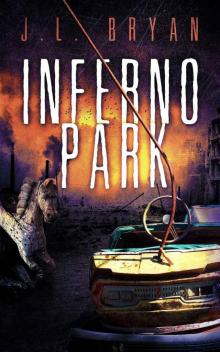 Inferno Park
Inferno Park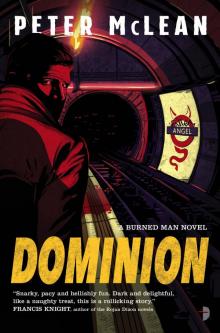 Dominion
Dominion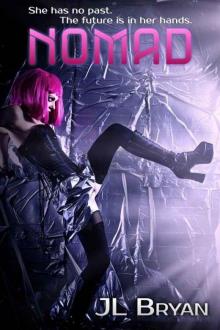 Nomad
Nomad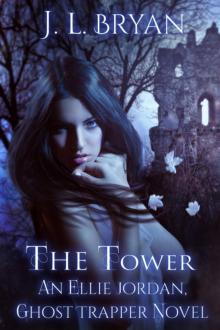 The Tower (Ellie Jordan, Ghost Trapper Book 9)
The Tower (Ellie Jordan, Ghost Trapper Book 9)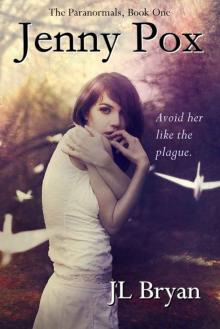 Jenny Pox (The Paranormals, Book 1)
Jenny Pox (The Paranormals, Book 1)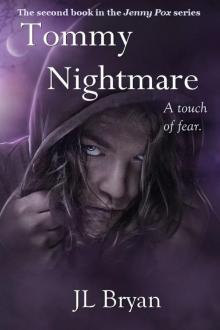 Tommy Nightmare (Jenny Pox #2)
Tommy Nightmare (Jenny Pox #2)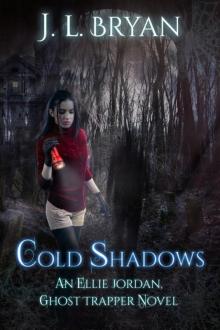 Cold Shadows (Ellie Jordan, Ghost Trapper Book 2)
Cold Shadows (Ellie Jordan, Ghost Trapper Book 2)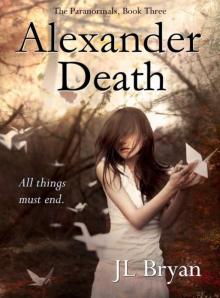 Alexander Death (The Paranormals, Book 3)
Alexander Death (The Paranormals, Book 3)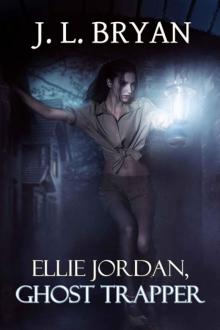 Ellie Jordan, Ghost Trapper
Ellie Jordan, Ghost Trapper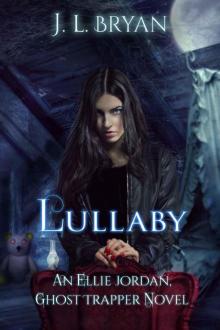 Lullaby (Ellie Jordan, Ghost Trapper Book 7)
Lullaby (Ellie Jordan, Ghost Trapper Book 7)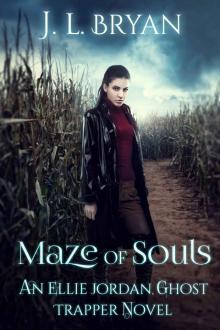 EJ06 - Maze of Souls
EJ06 - Maze of Souls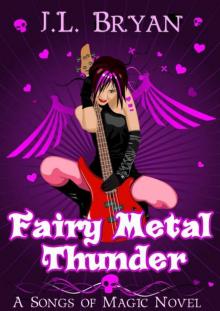 Fairy Metal Thunder (Songs of Magic, #1)
Fairy Metal Thunder (Songs of Magic, #1)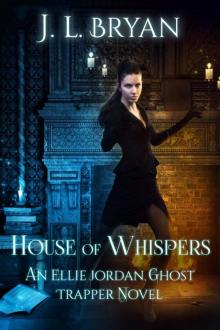 House of Whispers (Ellie Jordan, Ghost Trapper Book 5)
House of Whispers (Ellie Jordan, Ghost Trapper Book 5)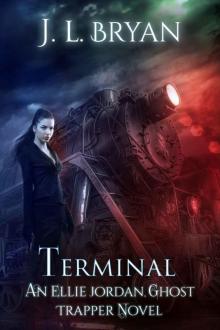 Terminal (Ellie Jordan, Ghost Trapper Book 4)
Terminal (Ellie Jordan, Ghost Trapper Book 4) Jenny Pox
Jenny Pox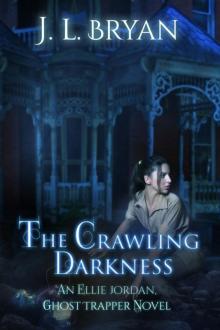 The Crawling Darkness (Ellie Jordan, Ghost Trapper Book 3)
The Crawling Darkness (Ellie Jordan, Ghost Trapper Book 3)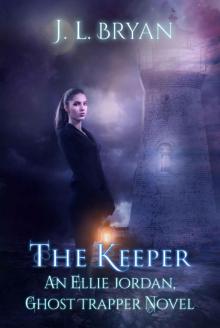 The Keeper (Ellie Jordan, Ghost Trapper Book 8)
The Keeper (Ellie Jordan, Ghost Trapper Book 8)